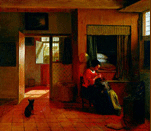










36.
The Personal is Pedagogical
Organizers:
Description:
Feminist pedagogy has long recognized the value of personal experience, and
in recovering the voices of early modern women, scholars of history and literature
have turned their attention both to women writing in traditional literary
forms and to women’s letters, diaries, speeches, mother’s advice
books, and other types of personal narratives. In this workshop we will explore
some possible ways of incorporating these texts into both literature and history
classes, and we will also discuss the value of incorporating our students’
own personal narratives into assignments and of incorporating modern media
portrayals of early modern women’s lives into the classroom.
We will open the workshop by briefly presenting some lesson plans. Donna Woodford will discuss an assignment which asks students, after reading and discussing Isabella Whitney’s “Will and Testament,” to write their own wills, using them, as Whitney does, as an opportunity for social criticism. Katherine Hoffman will discuss an assignment which requires students to first analyze Aemelia Lanyer’s working of the patronage system, and then asks them to discuss their own experience of “working” the educational system. Sharon Michalove will discuss the use of women’s diaries, letters, and personal writings in a history class, and the ways in which this might differ from their use in a literature class. She will specifically discuss methods of teaching the letters of Agnes and Margaret Paston and Honor Lisle, which reveal much about women’s roles as described in their own words and about how their lives intertwine with the events of their time. Suzanne Magnanini will discuss how she teaches, and criticizes, modern representations of early modern Italian women. She will focus specifically on the films Artemisia and Dangerous Beauty, the actions taken against Artemisia by Gloria Steinem and Mary Garrard, and websites dedicated to Veronica Franco and Artemisia Gentileschi, including a website by a modern day escort who calls herself “Veronica Franco.” This lesson asks students to consider what these figures mean to us today, how we are using them, and how women’s stories and lives might be used as modern political actions and expressions. Each of us will limit our preliminary overview to five minutes, and then we will open the workshop up, asking participants to share their own lesson plans or to ask questions about our lessons. To facilitate discussion and collaboration we will distribute a list of questions along with our reading list, and we will ask participants to come prepared with some ideas for lessons and with their questions and opinions about the use of early modern women’s personal narratives in either the literature or history classroom, about the incorporation of students’ personal experience into assignments and/or about the use of modern media portrayals of early modern women in the classroom.
Our four organizers met in the summer of 2001 at an interdisciplinary and comparative NEH summer institute on early modern women writers in Venice, London, and Paris, and Katherine Hoffman and Donna Woodford presented papers on teaching early modern women writers at the Renaissance Society of America conference in 2002. In both of these settings we found it was relatively easy to generate discussion about the teaching of early modern women, and we found it was very beneficial to hear the opinions of different teachers working in different disciplines. The idea of incorporating students’ personal writing into the teaching of early modern women seemed a particularly provocative topic, and elicited many ideas and opinions, even when some participants in the discussion had not been previously prepared. We will raise and discuss questions such as what pedagogical advantages this practice has and whether it, or the use of popular culture and modern media, risks detracting from the literary and historical texts being discussed or creating a less rigorous and challenging classroom environment. Since two of our organizers are looking at websites, or at material available on websites, we would like to have access to a computer and projector. We would also like to have a VCR so that, if the discussion turns to the films Artemisia and Dangerous Beauty, we could show brief clips of these films. They will not be shown in the preliminary overviews as time will not allow for that, but online reviews of the movies or a website featuring Steinem and Garrard’s response to “Artemisia” may be used.
Preliminary Readings:
|
|
|
||||||
|
|
 |
 |
|
||||
 |
|
 |
|
||||
|
|
|
||||||
|
|
|
||||||
 |
|
||||||
|
|
|
||||||
| |
|
||||||
 |
|
||||||
 |
|
||||||
 |
|
||||||
 |
|
||||||
|
|
|
||||||
|
|
 |
|
|
||||
 |
|
||||||
|
|
|
|
|
|
|
|
|